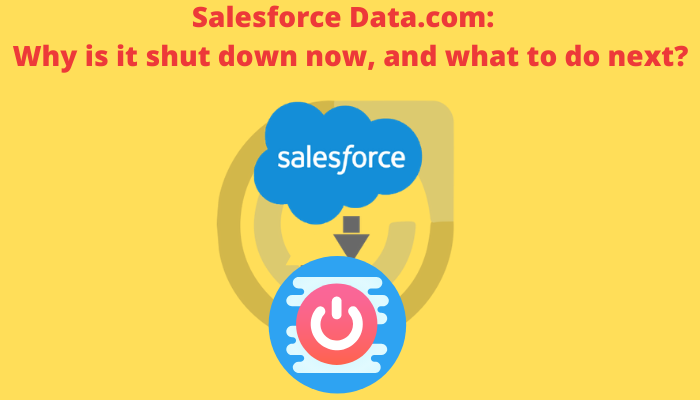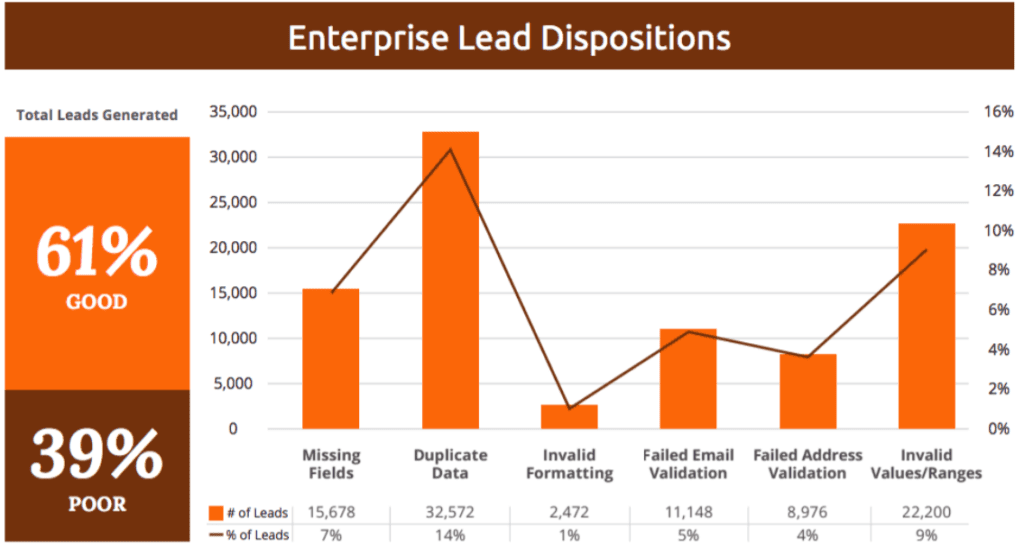"Salesforce discontinued data.com, which was reportedly making money for the company by offering qualified leads to the businesses. And if you are wondering.."

Salesforce discontinued data.com, which was reportedly making money for the company by offering qualified leads to the businesses. And if you are wondering and still trying to make sense of what happened, here’s why the leading cloud-based CRM services provider decided to pull the plug on its sales and B2Blead generation component. It seems like the end of an era, but a logical conclusion to a technology solution that has served its purpose and outlived its utility.
What is Salesforce Data.com?
According to its official website, Data.com is the first complete and native data solution inside Salesforce. Conceived with Dun & Bradstreet, the company scraps off the internet to build a contact list. The Salesforce CRM tools can access this contact list for workflow automation, email automation and marketing automation.
The company offers data mining services and data scrubbing services to businesses to maintain and update this data. The clean, reliable and qualitative data enables businesses to generate actionable insights and empowers them to stay ahead of the curve. The services of Data.com are classified into two segments, namely Clean and Prospector.
Salesforce Data.Com Clean
The Salesforce Clean boasts of powerful data verification tools that improve the quality of contact and lead data, enrich it further by adding relevant and target-specific details to it. The entire process, right from data appending to data scraping takes place inside Salesforce via Data.com
Salesforce Data.Com Prospector
The Prospector is native to Salesforce and is a tool used to search or filter through the target. Since the businesses are targeting a specific set of customers, the pipeline is much faster, bottlenecks are reduced, and the connection to the customers is more streamlined. The outreach program becomes more aligned to the marketing objective. The Prospector offers you a 360-degree view of sales and marketing processes right within Salesforce.
According to Salesforce, the existing connects within the system will be used to maintain the Data.com towards the end-of-life. Once it is achieved (by 2020), the contact database will be archived and will no longer be in use.
While the licenses of Prospector and Clean can’t be renewed now, these tools are slated to go out of circulation entirely and retire on July 31, 2020.
The journey of Salesforce Data.Com
Data.com came into being with Salesforce’s acquisition of Jigsaw. Even before this collab, Jigsaw was considered to be a quality tool that enabled businesses and sellers to democratise crowd-sourced data from different sources such as tax, mailing records, events or tradeshows. Businesses could exchange their compiled data and make the most of it.
Rechristened as Data.com, the Jigsaw’s democratisation of data appears to feel like more of an afterthought that was on the way to become irrelevant sooner than you might think. The advent of social media, especially LinkedIn, the sellers are getting better at contact sourcing and contacting the person directly without the circuitous routes of a lead generation portal. Then, there were targeted email marketing campaigns that emphasised on personalisation, whereas data.com provided contacts for mass-mailing and which were company-centric. The businesses, however, moved on to a proved ROI-based strategy where they communicated with buyers and companies that are the perfect fit for their business and services. The ROI-oriented account-based tools and not the ones handing out contacts is the need of the hour.
Since last year, it has stopped taking new customers. However, it is not the only one. Other big data and data mining services providers such as Salesloft’s Prospector, KiteDesk have closed the doors for new customers too. B2B companies and sales reps that relied heavily on contact data provided by the Data.com are still trying to understand the ‘whys’ and ‘whats’, and we help them find out exactly that!
One among the many reasons that Salesforce decided to call it quits with Data.com was to abide by the European Union’s General Data Protection Regulation (GDPR) that brings crowd-sourced data under the scanner. According to this law, “Organisations found breaching the GDPR can be fined up to four per cent of annual global turnover or an amount of €20 Million (whichever is greater).”
It is the maximum fine that can be levied upon the businesses that don’t adhere to most serious infringement yet the basic requirements of an outreach campaign such as having sufficient consent from the customer to use their data. Crowd-sourced data comes without any liability and is often duplicated. Once it enters into a system, it is difficult to ensure its hygiene. Regular CRM data cleaning and various checkpoints are the ways to keep data current and complete.
Besides, there are several data mining tools available in the market as opposed to when Salesforce started. While marketing automation has still a long way to go, the businesses now have a variety of tools outside the periphery of Salesforce while being highly compatible and platform-agnostic. The lack of new features to accommodate targeted and micro focussed marketing campaigns also contributed to its demise.
As social sourcing the contact becomes the widely-accepted form of lead generation, account-based selling takes the place of mass mailing, stringent laws for outreach campaign come into being, and businesses look beyond the CRM for data solutions, Salesforce has no option but to shut down Data.com
Nonsensical and Irresponsible Data Sanitation Practices
Data.com gained popularity for leading the way forward to the democratic availability of data. However, the idea of ‘of the people, by the people and for the people’ didn’t work out well. There were no sanity checks to the data uploaded, the data scrubbing practices were non-existent, and users could upload any data lists that they want. Experts like Neil Patel have always emphasised on the importance of paying attention to the origin of data rather than building an overloaded system. However, companies often fail to understand the 101 of data quality. Salespeople forget the core principle of their work that it is ever-evolving. People tend to change their jobs, address and email IDs, but the changed details rarely make it to the contact list.
When businesses hire a third-party database, the CRM gets inundated with outdated, duplicated and incomplete data. So, it shouldn’t come as a surprise that a sales rep end up wasting more than 546 working hours in a year owing to the bad data in the system.
Lack of regulatory practices
Data.com was cool for businesses before the latter realised its uncool lack and utter disregard for personalisation and data mining services. An outreach campaign to reach out to your customers isn’t about sending the same mail to an odd list of 10,000 people (Fact check: it is spam). It is about connecting with the customers they want it or the way they would prefer. So, when this data prospecting tool closes down completely, it shouldn’t come as a surprise. Missing fields, duplicate data, invalid formatting and invalid values just add to the madness of crowd-source data. Here’s just a sneak peek at enterprise lead disposition for businesses, showcasing the impact of poor quality data on B2B lead generation.

The lack of reinventing
Companies, these days, are thriving on data and focus on making a data-oriented system for their business processes. However, it is the quality of data that often gets overlooked. The email marketing campaigns are now interactive, more personalised and tend to serve a niche target segment. Cold calling or emailing is still relevant, but it is also quality over quantity. If only Data.com had reinvented its practices and had adopted a proactive approach towards email appending and data scrubbing, we wouldn’t be here talking about the downfall of it.





